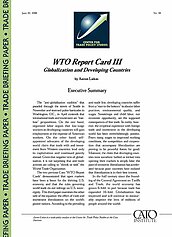The two previous Cato “WTO Report Cards” demonstrated that open markets have been a boon for the thriving U.S. economy and that the rules governing world trade do not infringe on U.S. sovereignty. This third paper examines the other side of the equation: the effect of trade and investment liberalization on the world’s poorer nations. According to the prevailing anti-trade line, developing countries suffer from a “race to the bottom” in abusive labor practices, environmental quality, and wages. Sweatshops and child labor, not economic opportunity, are the supposed consequences of free trade. In reality, however, the empirical experience with foreign trade and investment in the developing world has been overwhelmingly positive. From rising wages to improved working conditions, the competition and cooperation that accompany liberalization are proving to be powerful forces for good. Moreover, the claim that developing countries were somehow bullied or tricked into opening their markets is simply false; the pace of economic liberalization has accelerated because poor countries have realized that liberalization is in their best interest.
In the past half century since the founding of the General Agreement on Tariffs and Trade, the world economy has grown 6‑fold, in part because trade has expanded 16-fold. That growth has not led to the wholesale exploitation of workers in poor countries. To the contrary, globalization has made it possible for more people to lift themselves out of grinding poverty more quickly than was ever possible before. Globalization has improved and will continue to measurably improve the lives of millions of people around the world.


